
– Advertisement –
On November 5, 2024, a significant political shock hit Israel with the dismissal of Yoav Gallant, Minister of Defense, by Prime Minister Benjamin Netanyahu. This dismissal, which comes against a backdrop of intense war with Hamas in the Gaza Strip and tension along the northern border with Lebanon, highlights strategic differences within the Israeli government. Beyond the domestic impact of this decision, Gallant’s position on Lebanon diverged on some key points from Netanyahu’s line, which could affect regional stability and power relations on the Lebanese border.
Internal tensions and international repercussions
The decision to dismiss Gallant comes as Israel faces military pressure on several fronts. If the question of the conscription of the ultra-Orthodox is at the heart of this political crisis, it also highlights the differences of views within the government on the management of the war. Gallant, known for his more pragmatic security stance, has often taken a less intransigent line than Netanyahu in his deterrence strategy toward Lebanon, where Hezbollah poses an increasingly significant threat.
Gallant’s position on Lebanon: pragmatism and deterrence
As defense minister, Gallant distinguished himself by an approach that, while remaining firm, aimed to avoid an immediate escalation with Hezbollah. According to Israeli military sources, Gallant favored targeted deterrence measures and increased preparation of Israeli defenses in the north, without encouraging major preemptive attacks. On the other hand, Netanyahu has, on several occasions, shown a desire to increase pressure on Lebanon by mobilizing international opinion against Hezbollah and by increasing military deployment on the border.
Gallant particularly called for strategic vigilance along the northern border without triggering direct confrontation. His approach was to limit offensive actions while strengthening defensive military infrastructure around the border region. This strategy aimed to minimize the risks of an escalation that could force Hezbollah to retaliate, knowing that the Shiite organization could take advantage of regional tensions to intensify its operations against Israel. This moderation has at times been at odds with Netanyahu’s more aggressive agenda, which insists on a policy of “zero tolerance” in the face of perceived threats from Hezbollah and Iran’s influence in Lebanon.
Netanyahu’s approach: increased pressure on Hezbollah
For Netanyahu, the Lebanese question is not limited to military deterrence calculations alone. Aware of Iran’s growing influence in Lebanon through Hezbollah, Netanyahu sees the northern front as an extension of Tehran’s arm. For several years, he has called for an intensification of pressure on Hezbollah, a position which goes beyond simple immediate security issues for Israel and affects regional balance. This positioning is reflected in diplomatic actions and efforts to encourage the United States and other Western allies to take a stronger stance toward Lebanon.
Netanyahu’s strategy is based on the idea that only constant pressure and a rigid military posture can contain Hezbollah. Recently, he also ordered a series of military maneuvers on the Lebanese border, supported by a deployment of ISR (intelligence, surveillance and reconnaissance) drones to closely observe Hezbollah’s movements and strengthen the Israeli military presence. This military alignment in northern Israel, aimed at creating an anticipatory line of defense, was criticized by Gallant for its risks of escalation.
The consequences of Gallant’s departure for Lebanon
The dismissal of Gallant and his replacement by Israel Katz, who shares a vision similar to that of Netanyahu, could have significant repercussions for Lebanon. Katz, a former foreign minister, is known for his tough security stances and has often supported a hard line against threats from Hezbollah. His appointment could mark a turning point in the management of the Lebanese front, reinforcing the proactive and militarized approach advocated by Netanyahu.
This change in strategy could increase pressure on Lebanon and reignite tensions on the northern border. Lebanon, already weakened by internal political and economic crises, could find itself in a more unstable situation if Israel adopts an increasingly aggressive posture. Hezbollah, while seeking to avoid a major conflict, could feel pressured to respond to Israeli maneuvers, which could escalate into a military confrontation. Lebanese civil society, already tested by internal conflicts and the economic crisis, could find itself even more vulnerable if the region flares up.
A deeper involvement of Lebanon in the regional context
With the change of defense minister in Israel, Lebanon’s role in regional tensions could become even more central. Analysts say that Katz, strongly supporting Netanyahu’s line, may be more willing to undertake preemptive operations against Hezbollah, a strategy that Gallant has so far tempered. In this sense, Katz’s appointment could lead to a redefinition of Israeli defense priorities, putting Lebanon at the forefront of Israel’s security concerns.
This development also means that Lebanon could see intensifying international pressure to control Hezbollah’s influence on its territory. Netanyahu could use the move to strengthen security ties with allies like the United States and Europe, underscoring the need for a containment policy toward Hezbollah. This could result in strengthened sanctions against the organization, stricter financial restrictions, and closer collaboration with Lebanese actors opposed to Iranian influence.
A delicate situation for the stability of Lebanon
The implications for Lebanon of this change in Israeli defense leadership are numerous. On the one hand, the rise of a more proactive security policy in Israel could make mediation efforts aimed at reducing tensions more difficult. The hard line that Katz could adopt could exacerbate Hezbollah’s isolation, but also make the entire region more fragile. For the Lebanese government, which seeks to maintain a balance between the different factions, this development could prove destabilizing, with an increased risk of conflict.
On the other hand, Katz’s presence could mean increased pressure to strengthen the Lebanese army, as a moderate and stabilizing actor against Hezbollah. Netanyahu and Katz’s policies could indeed include encouraging the Lebanese army to take a more assertive role in border control. However, the Lebanese army’s ability to contain Hezbollah and prevent potential Israeli incursions remains uncertain, due to its limited resources and internal divisions within Lebanese society.
Conclusion: the future of Israeli-Lebanese relations at stake
In conclusion, the dismissal of Yoav Gallant and his replacement by Israel Katz mark a turning point in Israel’s security policy. While Gallant favored a pragmatic approach aimed at avoiding military escalation, Katz, closer to Netanyahu’s ideas, could take a harder line, particularly with regard to Lebanon. This development heralds an intensification of tensions on the northern border and could place Lebanon at the heart of Israeli strategic concerns in a context of increased pressure on Hezbollah and its Iranian supporters.
For Lebanon, this situation further complicates the political and security challenges it faces, with an already precarious balance between internal factions and a growing risk of confrontation with Israel. Whether this strengthened policy by Netanyahu and Katz will help deter Hezbollah or provoke a confrontation remains open, but the resulting uncertainty is undeniably a source of concern for regional stability.
– Advertisement –





